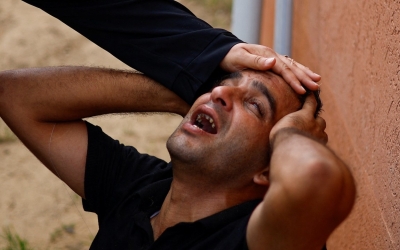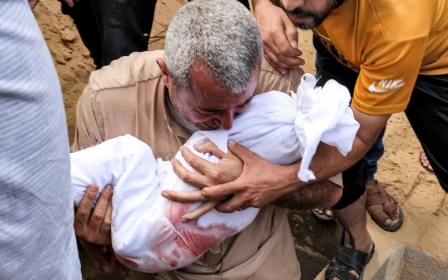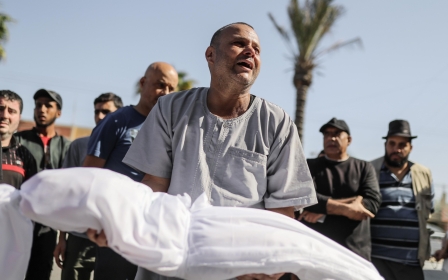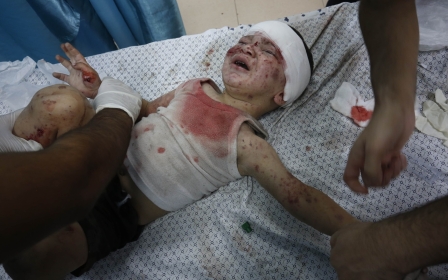Israel-Palestine war: In Gaza, whether we flee or stay, each night may be our last

It’s pitch black, and I hear nothing but low-flying jet fighters raining missiles nearby. Among my jumbled thoughts are the friends and relatives I’ve lost - at least nine so far - and whether I’ll make it through the night alive.
Living in the besieged Gaza Strip for 27 years and surviving five Israeli attacks on Gaza has taught me what to do in times of war.
It’s a pattern that keeps repeating itself. After the first bomb explodes, we rush to the nearest supermarket to stock up on high-carb foods, which can help us stay strong for a longer time. We bid farewell to loved ones, knowing our lives depend on the trajectory of the next missile.
In the case of a quick evacuation, we put important documents and cash in an emergency bag, leaving our most cherished memories at home. We crowd together in our main room so that if the house were bombed, we could all be found together.
The most important lesson is to never trust the night, which is when Israel commits its most horrific atrocities.
Since Israel declared war on Gaza in response to a surprise attack by Palestinian fighters on 7 October, it’s been 10 days of nonstop, intense bombardment across the besieged territory - and it’s getting worse by the day, with no one and no place safe.
A shocking massacre
On Tuesday, Israeli warplanes committed a horrific massacre by targeting the al-Ahli Hospital, which, at the time, was overflowing with patients who were already injured and displaced from their homes due to ongoing intensive Israeli air strikes.

Many had sought the hospital as a sanctuary, anticipating it to be off-limits for military strikes. Early estimates suggest a staggering toll, with over 500 casualties, most of whom are women and children. This crime marks a record in the history of Israeli massacres against the Palestinian people.
Through this shocking massacre, Israel seems intent on inciting fear among the Palestinians in Gaza City and its northern regions. The objective? To compel them to flee southward. This narrative has been propagated through Israel’s state media since the onset of the current hostilities. However, despite these efforts, there remains a discernible determination among the Palestinian populace.
In a historical context, one cannot overlook the pattern of utilising brutal tactics as a means to instill fear and force displacement, a strategy deeply ingrained in the Zionist colonial framework. From its very foundations, Israel has employed this strategy. The events of 1948, marked by several horrific massacres such as Deir Yassin, were clear efforts to incite terror among Palestinians, urging them to abandon their hometowns.
This backdrop casts the al-Ahli Hospital massacre in a familiar light, echoing sentiments from the historical Zionist thought. Fuelling Israel’s audacity to carry out these genocidal attacks are its seemingly unwavering sense of impunity and its "unconditional support" from the US.
Western complicity
We feel lonely as never before. Western countries have expressed their unconditional support for Israel. Arab states, reduced to mere oil oligarchies, have abandoned us in the name of their own business.
Despite this, Israel is terrified that evidence of its crimes will pulverise its propaganda, in the same way that its missiles destroy our homes.
Among the thousands of civilians killed or injured in Israel’s air strikes, 11 journalists have died. The Israeli Air Force has targeted telecommunications and internet infrastructure across Gaza, preventing us from sharing information about the ongoing massacres.
Follow Middle East Eye's live coverage for the latest on the Israel-Palestine war
The rest is handled by the West’s complicity. Social media platforms are removing Palestinian content. Steve Bell, the Guardian’s long-serving cartoonist, was fired over a drawing of Israeli Prime Minister Benjamin Netanyahu. Protests in support of the Palestinian people have been violently suppressed.
A ceremony at the Frankfurt Book Fair to award a literary prize to Adania Shibli, a Palestinian writer, has been cancelled. In France, Palestinian activist Mariam Abu Daqqa has been arrested on the orders of the interior ministry.
We said our final goodbyes to departing relatives, knowing that this could be the last time we ever saw them
Meanwhile, Israel will continue to commit crimes that go unpunished. In just six days, it dropped around 6,000 bombs on Gaza, nearly the same amount used in Afghanistan in all of 2019. More than 3,500 Palestinians have been killed and more than 12,000 injured in Gaza, including dozens of doctors and medical personnel.
The number of fatalities in Gaza during the past 10 days has surpassed the total number of deaths during the 51-day war in 2014. Hundreds more people are believed to be trapped beneath the rubble. Dozens of entire families have been wiped out and thousands of housing units have been destroyed.
Around half of Gaza’s population has been displaced, with many seeking shelter in Unrwa schools or hospitals - which have themselves been targeted by Israeli bombs.
My two sisters were fortunately able to flee their homes before the buildings were bombed. We have told my grandchildren that they are just staying with their grandparents for a few days. When they start missing their homes and toys, we do what we can to distract them.
Fleeing to nowhere
After Israel told 1.1 million people in northern Gaza, including my family, to move south, two groups emerged. The most desperate fled on foot or in makeshift vehicles, with only a few rags and no idea as to where they were going. Many others opted to remain in place, repeating the mantra: “If we live or die, it will be in our homes.”
After all, there are precedents. My grandmother, Sharifa, used to tell me stories about the Nakba. I could never truly imagine it - but now, I feel I am living it.
I recall her telling me that her family members took enough clothes for two days when they left their homeland, hoping to return soon. Seventy-five years later, she is still waiting.
My family and I decided not to make the same mistake. We said our final goodbyes to departing relatives, knowing that this could be the last time we ever saw them.
My friend, Waseem, begged me to leave, thinking it would be safer in Gaza’s south, but I chose to stay. Shortly after he left, Israeli forces shelled civilians on the road they had identified as a safe exit route, killing at least 70 people.
I was barely able to contact my friend due to a poor phone connection; when I did, his voice sounded terrified, but at least he was still alive.
“It was right in front of my face,” he told me. “It was a construction truck packed with people. Mothers carrying their children, all of them were killed on the street. All of them were peaceful people. They were fleeing.”
Dreams destroyed
No one believes they will survive the war at this point. We have seen dozens of Israeli air strikes in Deir Balah, Khan Younis, Rafah and other areas in the south, where Israel told the population to relocate. Israel wants to convince us that we will never be safe.
We are guilty of having hoped, and for a moment even believed, that we deserved a good life, a quiet life - or at least a normal life without constant bombs, fear and loss.
The days pass with the agony of not knowing the latest news, because we have no electricity or internet connection. This agony intensifies in the brief moments when the signal returns; my heart pounds rapidly in my chest, for fear of new messages that we don’t want to read.
Youssif was always telling me about how he longed to visit his grandfather's homeland in occupied Palestine. This can never happen now
Last Saturday, I received a WhatsApp message from a friend’s cousin in the United States, saying: “I’m sorry to tell you, but Youssif was killed, along with 14 of his family in an Israeli air strike on their house.”
Bereft, I told him it could not be true. I then called a mutual friend, whose sobs and silence confirmed the horrific news.
Youssif was one of my closest friends. We shared laughter, meals, and dreams of a bright future that have now been destroyed. Youssif was always telling me about how he longed to visit his grandfather’s homeland in occupied Palestine. This can never happen now.
With a broken heart, I see that it’s pitch black again. I hear nothing but low-flying jet fighters raining missiles nearby, and I wonder how many Youssifs will be killed before the Israelis stop this massacre in front of the world’s eyes.
The views expressed in this article belong to the authors and do not necessarily reflect the editorial policy of Middle East Eye.
Middle East Eye propose une couverture et une analyse indépendantes et incomparables du Moyen-Orient, de l’Afrique du Nord et d’autres régions du monde. Pour en savoir plus sur la reprise de ce contenu et les frais qui s’appliquent, veuillez remplir ce formulaire [en anglais]. Pour en savoir plus sur MEE, cliquez ici [en anglais].






